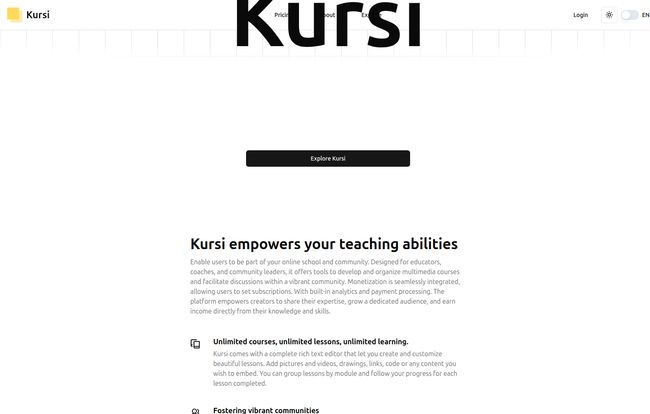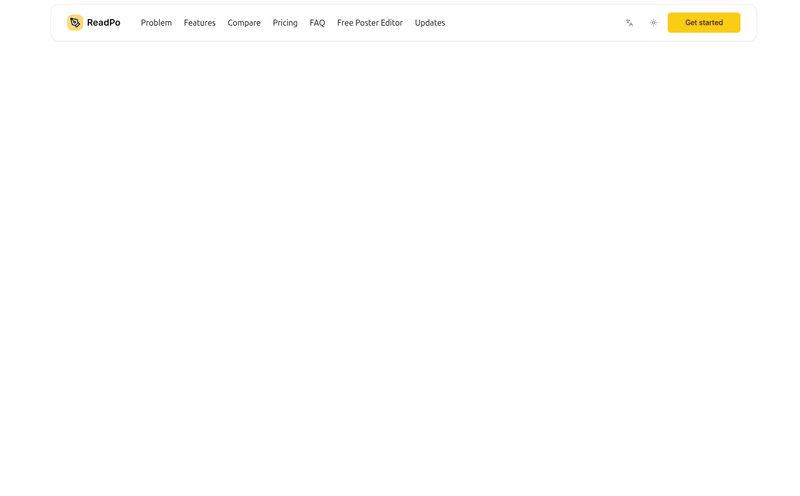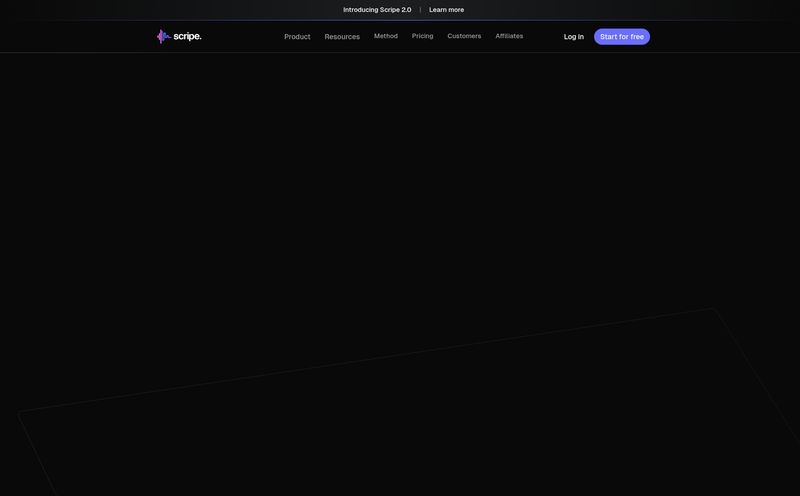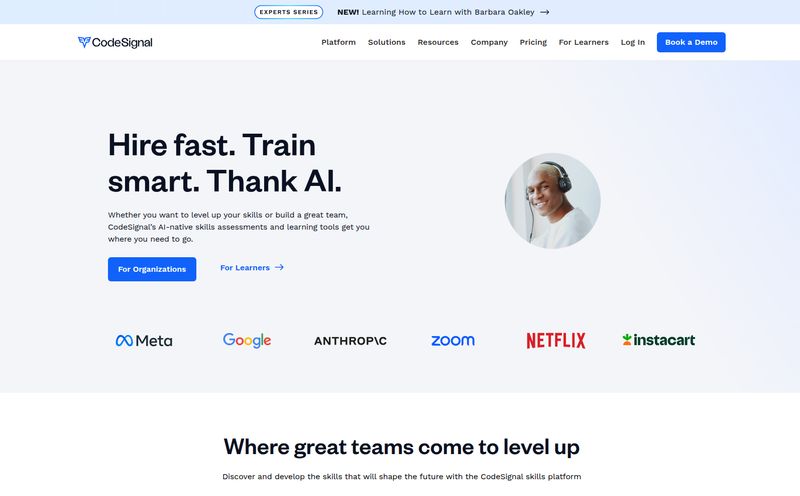If you're an expert in something—anything, really—the thought has crossed your mind. That little whisper that says, "I could teach this. I could build something." For years, I've seen countless talented folks, from killer SEOs to master sourdough bakers, sit on a goldmine of expertise because the tech side of things felt like a mountain too high to climb. Setting up a website, figuring out payments, building a course... it's a lot.
The market is flooded with platforms that promise to make it easy, but they often feel bloated, complicated, or they take a huge cut of your hard-earned money. It’s a classic creator's dilemma. That’s why when a tool like Kursi pops up on my radar, with its clean, minimalist vibe, I have to take a look. It promises to be a space for creators to build online schools, foster communities, and get paid for it. But does it deliver? I’ve spent some time kicking the tires, and here’s my honest take.

Visit Kursi
First Off, What is Kursi Anyway?
At its heart, Kursi is an all-in-one platform designed for people who want to sell their knowledge. Think of it as the digital real estate where you can build your own online school. It’s not a marketplace where you're just another face in a giant catalog, competing on price. No, this is about creating your own branded space. It’s for educators, coaches, community leaders—anyone who wants to bring a group of people together around a shared passion or skill and create a real business from it.
The whole idea is to combine three critical pieces: course creation, community interaction, and monetization. Instead of duct-taping a course plugin to a forum software and a separate payment processor, Kursi aims to bring it all under one roof. Simple concept, but getting it right is the tricky part.
The Core Features That Actually Matter
A platform can have a million bells and whistles, but if the core stuff is clunky, it’s useless. I'm always looking for simplicity and power. Here’s how Kursi breaks down in the areas that count.
More Than Just a Course Builder
The foundation of any teaching platform is, well, the teaching tools. Kursi's course creator is straightforward and refreshingly powerful in its simplicity. You can create unlimited courses and lessons, which is a huge plus. The editor lets you pull in all sorts of media—not just text and video, but also pictures, drawings, and even code snippets. This is fantastic for a wide range of topics. A developer could use it to teach Python, a graphic designer could use it to share illustrations, and a chef could embed recipe cards and video tutorials.
You can structure your content into modules, which helps students follow a clear path and track their progress. It feels less like a rigid, old-school learning management system and more like a flexible canvas for your ideas.
Building Your Tribe with The Community Aspect
This, for me, is where things get interesting. A course without a community is just a textbook. A course with a community is an experience. Kursi seems to get this. They've built-in a newsfeed and messaging system right into your school. This turns a one-way information dump into a two-way conversation. Students can ask questions, share their wins, and connect with each other. It’s like having a private social network just for your members.
"Our passion is bringing people together. Beyond learning, we provide shared experiences."
This quote from their site resonates with me. Building that 'stickiness'—the reason people stay long after they've finished the lessons—is the secret to long-term success in the creator economy. It's what turns a one-time customer into a lifelong fan. This is a feature that some of the bigger, more established platforms are still trying to bolt on as an afterthought.
Let's Talk Money, Monetization Made Simple
Getting paid should be the easy part, right? Kursi handles this through Stripe, which is the industry standard and a name I trust. You can set up one-time payments for individual courses or, my personal favorite, recurring subscriptions for ongoing access to your community and content. The billing is described as "all-inclusive," which I take to mean they handle the complexities so you dont have to. Connect your Stripe account, set your price, and you're good to go. This direct-to-creator payment model is so much more empowering than waiting for a monthly payout from a marketplace that takes a 50% cut.
A Look at Kursi's Pricing Structure
Okay, let's get down to the brass tacks. How much is this going to set you back? Kursi keeps its pricing refreshingly simple with two main tiers. Both come with a 7-day free trial, which is great for getting a feel for the platform before you commit.
| Plan | Monthly Price | Who It's For | Key Features |
|---|---|---|---|
| Starter | $49 | Creators just starting out or testing an idea. | Accept Stripe payments, unlimited courses, unlimited lessons. |
| Premium (Most Popular) | $79 | Creators serious about building a community-driven school. | All Starter features, plus community tools (chat & newsfeed) and an AI lesson writer. |
In my opinion, the Starter plan at $49/month is a solid entry point. If you just want to create and sell a course without the deep community features, it has everything you need. But the real magic, I think, is in the Premium plan. For an extra $30, you get the community tools which, as I've said, are the key to building a sustainable business. The addition of an "AI lesson writer" is intriguing too. While I'm always a bit skeptical of AI content tools, it could be a decent helper for outlining lessons or beating writer's block. For a serious creator, the $79 plan seems like the obvious choice.
The Not-So-Perfect Bits
No tool is a silver bullet. It's important to go in with your eyes open. Based on the information, here are a few things to consider.
First, success on a platform like this is entirely on you. That's both a pro and a con. Kursi gives you the tools, but it doesn't give you an audience. You are responsible for marketing your school and building your community from scratch. This isn't a platform where students will just stumble upon you. You need to have a traffic generation plan, whether that’s through social media, a blog, SEO, or paid ads.
Second, your income is directly tied to the quality of your content. If your course is mediocre or your community is a ghost town, people won't pay. The bar is high, but that’s a good thing. It forces you to create real value.
Lastly, the reliance on Stripe is great for simplicity, but it does mean you're tied to their ecosystem. This is pretty standard across the board, but if for some reason you can't use Stripe, this platform won't be for you.
Who Is Kursi Really For? And Who Should Pass?
After looking it all over, I have a pretty clear picture of the ideal Kursi user. This platform is perfect for the passionate expert who values community as much as content. If you're a coach who wants a private hub for your clients, a yoga instructor building a subscription-based virtual studio, or a marketing consultant creating a high-value mastermind group, Kursi looks like a fantastic fit. It's for people who want to own their brand and build genuine connections.
Who should maybe look elsewhere? If you're looking for a completely free option to start, this ain't it. If you need super advanced marketing funnels with complex automations and A/B testing built right in, you might need a more heavyweight (and more expensive) platform like Kajabi. And if you're just looking to sell a one-off, low-cost course and dont care about community, the monthly fee might feel a bit steep.
Frequently Asked Questions About Kursi
- How do I get paid with Kursi?
- Kursi integrates directly with Stripe. You connect your Stripe account, and when a student pays, the money goes directly to you through Stripe's system, minus their standard processing fees.
- Is there a free trial to test it out?
- Yes, absolutely. Both the Starter and Premium plans come with a 7-day free trial so you can explore the platform and see if it's a good fit for you before spending any money.
- What kind of content can I include in my lessons?
- It's very flexible. You can use their rich text editor to add text, pictures, videos, drawings, links, and even embeddable code. This makes it suitable for a huge variety of subjects.
- Can I build a community even without a big course?
- Yes! With the Premium plan, you could primarily use Kursi as a paid community hub. You could offer light content and focus on the discussions and connections in the newsfeed and chat, making it a great option for a membership site.
- Is Kursi a good platform for complete beginners?
- I'd say yes. The focus on simplicity and having everything in one place removes a lot of the technical hurdles that stop people from starting. You still need to bring the expertise and the marketing plan, but the platform itself seems very approachable.
Final Thoughts on Kursi
So, what's the final verdict? I'm genuinely optimistic about Kursi. It appears to have a strong point of view: that building a creator-led business is about more than just transactions. It’s about teaching, sharing, and connecting. By focusing on a clean interface and the essential tools for course creation and community, it cuts through a lot of the noise in this space.
Is it the right tool for everyone? Of course not. But for the modern creator who wants to build a real, sustainable online school and community around their passion, Kursi seems like a very, very strong contender. It provides the structure; you just have to bring the magic. And for many, that's the perfect partnership.



